Logista is committed to minimising the environmental impact of its activity.
Our Quality and Environment Master Plan and Quality, Environment and Energy Efficiency Policy establish guidelines and good practices for optimising the use of resources and preventing pollution from processes. These are in strict compliance with regulations and with the voluntary targets signed up to by the Group.
Logista is therefore involved in various initiatives that aim to control and manage the current and foreseeable impacts of its activity on the environment, and to address key environmental aspects.
Logista has specified the main environmental and quality indicators relevant to its sustainable development, and monitors and evaluates these regularly, carrying out energy audits in each country and for each business.
In addition, Logista promotes respect for the environment among its employees, customers, suppliers and society as a whole. Logista was one of the signatory companies to Spain’s ‘manifesto for a sustainable economic recovery’ published in 2020. This declaration advocates a recovery towards a more sustainable and robust economy, calling for the establishment of alliances to ensure that, in addition to being effective from a socioeconomic perspective, stimulus policies that respond to the COVID-19 pandemic are aligned with sustainability policies and with the European Green Deal.
The Quality, Environment and Energy Efficiency Policy is available on the Group’s Intranet and on its corporate website, so that all employees and other stakeholders can be familiar with it.
Pursuant to the ISO 14064 standard, Logista has also calculated its carbon footprint, using the methodology set out in the GHG Protocol. The Environmental Management System of Logista’s businesses in Spain is also certified according to the ISO 14001 standard.
Logista is involved in various initiatives that aim to control and manage the current and foreseeable impacts of its activity on the environment, and to address key environmental aspects.
LIST OF ISO 14001-CERTIFIED CENTRES
| Business Unit |
Centre |
Certifying body |
Expiry date |
Scope |
| INTEGRA2 |
CORPORATE HEADQUARTERS |
BUREAU VERITAS |
01/11/2020 |
Industrial parcel transport and distribution |
| INTEGRA2 |
SANT ANDREU DE LA BARCA |
BUREAU VERITAS |
01/11/2020 |
Industrial parcel transport and distribution |
| INTEGRA2 |
GETAFE |
BUREAU VERITAS |
01/11/2020 |
Industrial parcel transport and distribution |
| LOGESTA |
LEGANÉS |
AENOR |
30/03/2022 |
Management of the national and international road transport of general goods. |
| LOGISTA Spain |
LEGANÉS |
BUREAU VERITAS |
24/07/2021 |
The storage and distribution of tobacco and complementary items; postage stamps; stamped documents; lottery tickets; retail consumer goods; electronic transactions. |
| LOGISTA Spain |
RIBA-ROJA |
BUREAU VERITAS |
24/07/2021 |
The storage and distribution of tobacco and complementary items; postage stamps; stamped documents; retail consumer products. |
| LOGISTA Spain |
BARCELONA |
BUREAU VERITAS |
24/07/2021 |
The storage and distribution of tobacco and complementary items; postage stamps; stamped documents; retail consumer products. |
| LOGISTA Spain |
LA RIOJA |
BUREAU VERITAS |
24/07/2021 |
The storage and distribution of tobacco and complementary items; postage stamps; stamped documents; retail consumer products. |
| LOGISTA Spain |
LLANERA |
BUREAU VERITAS |
24/07/2021 |
The storage and distribution of tobacco and complementary items; postage stamps; stamped documents; retail consumer products. |
| LOGISTA Spain |
SEVILLE |
BUREAU VERITAS |
24/07/2021 |
The storage and distribution of tobacco and complementary items; postage stamps; stamped documents; retail consumer products. |
| LOGISTA Spain |
ANDUJAR |
BUREAU VERITAS |
24/07/2021 |
The storage and distribution of tobacco and complementary items; postage stamps; stamped documents; retail consumer products. |
| LOGISTA PHARMA |
LEGANÉS |
SGS |
12/03/2022 |
Pharmaceutical and healthcare product logistics (handover, warehousing, order picking and shipping), reverse logistics (returns of pharmaceutical and healthcare products), partial manufacture of medicines and investigational medicines (secondary packaging), management of sample archives and management of promotional material logistics. Customer service. |
| LOGISTA PHARMA |
PIERA |
SGS |
12/03/2022 |
Pharmaceutical and healthcare product logistics (handover, warehousing, order picking and shipping), reverse logistics (returns of pharmaceutical and healthcare products), partial manufacture of medicines and investigational medicines (secondary packaging), management of sample archives and management of promotional material logistics. Customer service. |
| LOGISTA PHARMA |
LAS PALMAS ENTRERRIOS |
SGS |
12/03/2022 |
Pharmaceutical and healthcare product logistics (handover, warehousing, order picking and shipping), reverse logistics (returns of pharmaceutical and healthcare products), partial manufacture of medicines and investigational medicines (secondary packaging), management of sample archives and management of promotional material logistics. Customer service. |
| LOGISTA PHARMA |
WAREHOUSE C |
SGS |
12/03/2022 |
Pharmaceutical and healthcare product logistics (handover, warehousing, order picking and shipping), reverse logistics (returns of pharmaceutical and healthcare products), partial manufacture of medicines and investigational medicines (secondary packaging), management of sample archives and management of promotional material logistics. Customer service. |
| LOGISTA PHARMA |
LAS PALMAS DE GRAN CANARIA |
SGS |
12/03/2022 |
Pharmaceutical and healthcare product logistics (handover, warehousing, order picking and shipping), reverse logistics (returns of pharmaceutical and healthcare products), partial manufacture of medicines and investigational medicines (secondary packaging), management of sample archives and management of promotional material logistics. Customer service. |
| LOGISTADIS |
MADRID CORPORATE HEADQUARTERS |
BUREAU VERITAS |
24/07/2021 |
The storage and distribution of food (excluding frozen products) and beverages |
| LOGISTADIS |
CABANILLAS DEL CAMPO |
BUREAU VERITAS |
24/07/2021 |
The storage and distribution of food (excluding frozen products) and beverages |
| NACEX |
HOSPITALET |
AENOR |
19/11/2022 |
The express documentation and parcel delivery service and associated activities (pickup, handling, storage, distribution and delivery) |
| NACEX |
COSLADA |
AENOR |
19/11/2022 |
The express documentation and parcel delivery service and associated activities (pickup, handling, storage, distribution and delivery) |
| NACEX |
BARBERÁ DEL VALLÉS |
AENOR |
19/11/2022 |
The express documentation and parcel delivery service and associated activities (pickup, handling, storage, distribution and delivery) |
Environmental management
Logista includes environmental risks and opportunities in its multidisciplinary procedure for managing risks across the Group. The risk assessment process takes environmental risks and opportunities into account, including those arising from changes in regulations, the physical environment and other climate-related developments.
In 2020, for the first time, Logista incorporated the recommendations of the Task Force on Climate-related Financial Disclosures (TCFD) into the assessment of risks and opportunities related to climate change. Introducing the TCFD recommendations at Logista is a project that is currently underway and consists of two phases; the first of which has already been completed and whose results are presented in this report.
These recommendations apply not only to financial institutions but to any other organisation, particularly the four sectors potentially most affected by climate change: energy, transport, materials and buildings, and agriculture, food and forestry. The objective of this initiative is to provide information about the economic impact of climate change on the organisation, so that the Group’s stakeholders (whether they are clients, lenders or investors) can understand the material risks ahead.
The TCFD analysis carried out by Logista has considered two sets of physical scenarios (low emissions and high emissions) and two sets of transition scenarios (Stated Policies Scenario and Future Policies for Sustainable Development).
Emissions scenarios
a) Low emissions:
Logista has selected the RCP 4.5 scenario as the common scenario for lower emissions into the atmosphere. The outlook in the RCP 4.5 scenario sees major mitigation actions being taken and therefore emissions into the atmosphere peaking around the year 2040, then beginning to decline.
b) High emissions:
The company has chosen the RCP 8.5 scenario for analysing climate projections in a future with high emissions. In RCP 8.5, the outlook is a Business-as-Usual (BaU) scenario in which GHG emissions continue to rise at their current pace. This is a worst-case scenario of higher GHG emissions into the atmosphere and higher global warming.
Transition scenarios
a) Stated Policies Scenario (SPS): only policies that have been formally adopted by governments or are derived from current trends already observed in social, business, technological or market fields have been considered. For example, Spain’s National Energy and Climate Plans.
b) Future Policies for Sustainable Development scenario: the scenario adopted is of more ambitious reductions than current policies, in which the rise in global temperatures is kept well below the 2ºC indicated in the Paris Agreement.
Logista has analysed the above emissions and transitional scenarios outlined by the TCFD, through which it has identified future risks and opportunities.
Logista subsequently assessed the impacts in terms of economic parameters (impact on revenue, expenditure, assets, etc.), in line with the TCFD. The impacts on the Group’s specific services (products and services, supply chain/value chain, adaptation and mitigation, investment in R&D and operations) were also assessed, together with the Group’s resilience to impacts, i.e. its capacity to respond to physical and transitional risks and to take advantage of opportunities identified.
To be able to fulfil the requirements of the TCFD, a cross-cutting procedure has been implemented in the organisation that involves all members of the organisation in identifying and assessing risks.
Under Logista’s risk management system, the identification and assessment of risks, including risks related to the environment, must be carried out at least once per year. In reality, the frequency is greater (weekly or more often) due to the ongoing monitoring and revision of the risk management process.
This risk management process is applied to all the Group’s business areas, departments and in all countries in which it operates (Spain, France, Italy, Portugal and Poland).
The results of this risk identification and assessment process are reported to the Audit and Control Committee.
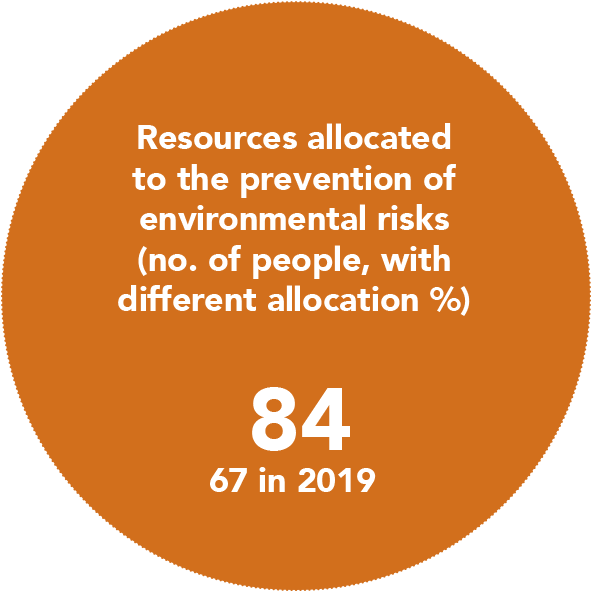
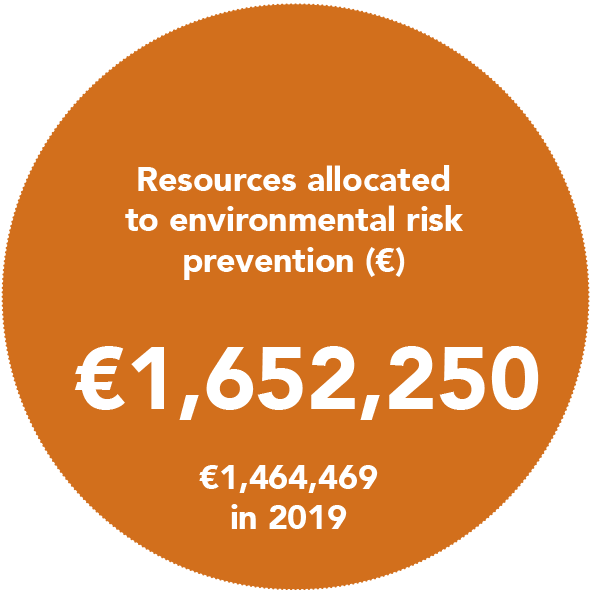
Procedure for prioritising climate-related risks and opportunities
Climate change risks and opportunities are prioritised on the basis of the ratings obtained from applying the corporate methodology. However, all climate-related risks and opportunities, not only those with a significant impact, are taken into account in the Company’s strategy and objectives.
This methodology generally covers a period of between five and seven years, because a longer period would involve more uncertainties. However, depending on the type of risk, a longer period could be considered.
The procedure for prioritising environmental risks and opportunities follows the same stages as the risk management procedure across the Group.
Logista has also prepared a TCFD-compliant report on climate-related risks and opportunities, fulfilling the requirements of the four declarations (governance, strategy, risk management and objectives and metrics).
Given the Group’s business activity, Logista does not have any environmental provisions or guarantees that could be significant in relation to the Company’s assets, its financial position or results. However, Logista is insured, applying the precautionary principle, through a civil liability policy that covers claims for personal injury and damages accidentally caused by sudden or unexpected contaminating events.
Main environment-related risks and opportunities
TRANSITIONAL RISKS
| Risk |
Relevance |
Explanation |
| Current regulations |
Relevant |
Carbon taxes on fossil fuels are relevant for Logista, because although Logista sub-contracts vehicles for its transport activity, incorporating them into its activity, any carbon tax that is applied to fossil fuels will affect Logista's operational costs through its impact on the prices of transport providers sub-contracted by Logista. |
| For this reason, this type of risk has been classified as relevant, with a high probability, and a moderate to low impact. |
| New regulations |
Relevant |
The Paris Agreement has been ratified by all the countries in which Logista operates, and the European Union requires all countries to stipulate and implement more ambitious climate plans. This could include a strategy for decarbonising the road transport sector.
This will also be complemented by increasingly greater restrictions on vehicles' access to cities. It is envisaged that these restrictions, until now isolated and supported by local regulations, may become widespread in all cities, supported by a common regulatory framework.
The Group may be indirectly affected by this risk, since its transport operations are sub-contracted, and account for more than 90% of all Logista's emissions.
In addition, new environmental regulations are envisaged that levy taxes on non-reusable plastic packaging. These new regulations would have an impact on Logista, whether directly through the plastic packaging used in its own distribution processes, or indirectly from the plastic from products that the Company introduces to the market.
This type of risk has been identified as relevant, with a high probability and a moderate to low impact. |
| Technology |
Relevant |
New technology designed to reduce carbon emissions from transport is relevant to Logista, since existing and future regulations are pushing in this direction, and 90% of the Company's emissions are generated by its transport division's activity.
This type of risk has been identified as relevant, with a moderate probability and a moderate to low impact. |
| Legal |
Not relevant |
Legal risks have been identified as not relevant due to the nature of Logista's business activity.
Moreover, the Group considers that there is little probability of this risk materialising and the impact if it did would be low. |
| Market |
Not relevant |
Logista distributes different types of products, and a change in consumer behaviour may affect the business of the Group in question.
This risk has been identified as not relevant to Logista. |
| Reputational |
Not relevant |
This risk has been identified as not relevant to Logista, since the Group's business model helps to minimise the main climate-related impact. |
PHYSICAL RISKS
| Risk |
Relevance |
Explanation |
| Acute physical |
Relevant |
Acute physical risks mean those that are caused by events, including the greatest severity of extreme weather events such as cyclones, hurricanes and floods. Cyclones and hurricanes do not affect the countries in which Logista operates. Storms and floods are possible, although their probability is very low.
Floods or storms could cause an interruption to distribution activity at the Group's warehouses.
However, the number and frequency of these events is very low, having affected only two of Logista's more than 650 facilities in recent years. Logista's quick and effective response in the materialization of this risk resulted in a low impact. However, the fact that a service interruption may occur implies that the impact of this risk should be considered "medium". |
| Chronic physical |
Not relevant |
Temperature and rainfall patterns may change, affecting animal species such as Lasioderma serricorne, commonly known as the tobacco beetle. Logista stores and distributes the final tobacco product, so the probability and the impact of any plague is much lower than at the manufacturer's premises.
This risk has therefore also been identified as not relevant. |
OPPORTUNITIES
| Opportunity |
Explanation |
| New regulations |
Opportunity viewed as a competitive advantage in an increasingly ambitious environmental regulatory context. Logista has financial capacity and extensive experience of operating in strict regulatory contexts, such as the pharmaceutical sector, in which it not only complies with requirements but is able to anticipate them. When translated to the environmental context, this experience and capacity may offer the Company a competitive advantage. |
| Efficiency of resources |
Reducing costs, a consequence of an increasingly stringent introduction of energy efficiency standards at the Company's premises and in its processes. Logista combines the construction of new facilities in accordance with more stringent energy efficiency standards with continuous improvements in the efficiency of its existing premises and processes. |
| Energy resources |
Cost reductions resulting from falling production costs of electrical energy from renewable sources. Logista uses electricity from renewable sources at 99% of its premises. |
| Market |
In terms of reputation and positioning, the Company's sound strategy for climate change management has a positive impact on Investment Groups and other stakeholders. |
Climate change
The Group calculates and promotes the reduction of its carbon footprint, as part of its initiatives to minimise the environmental impact of its activity.
Logista calculates the carbon footprint of all its businesses and activities in the different countries in which it operates, including the majority of the Group’s outsourced activities, such as 100% of the emissions resulting from transport and franchise operations, as well as indirect activities such as the purchase of goods and services, based on the emissions factors and standard for reporting Greenhouse Gases (GHG) of the Greenhouse Gas Protocol (GHGP) and on the UNEEN-16258 standard.
An independent accredited entity verifies the carbon footprint calculation under the UNE-EN ISO 14064 standard, confirming the figures, reliability and traceability of the process.
The Group’s transport division also notifies its clients, free of charge, of the carbon footprint of their deliveries and travel.
Logista has significantly improved its efficiency ratio through its continued efforts to optimise energy effciency in its processes and premises, representing a decline of its emissions in absolute terms.
Greenhouse gas emissions 2020
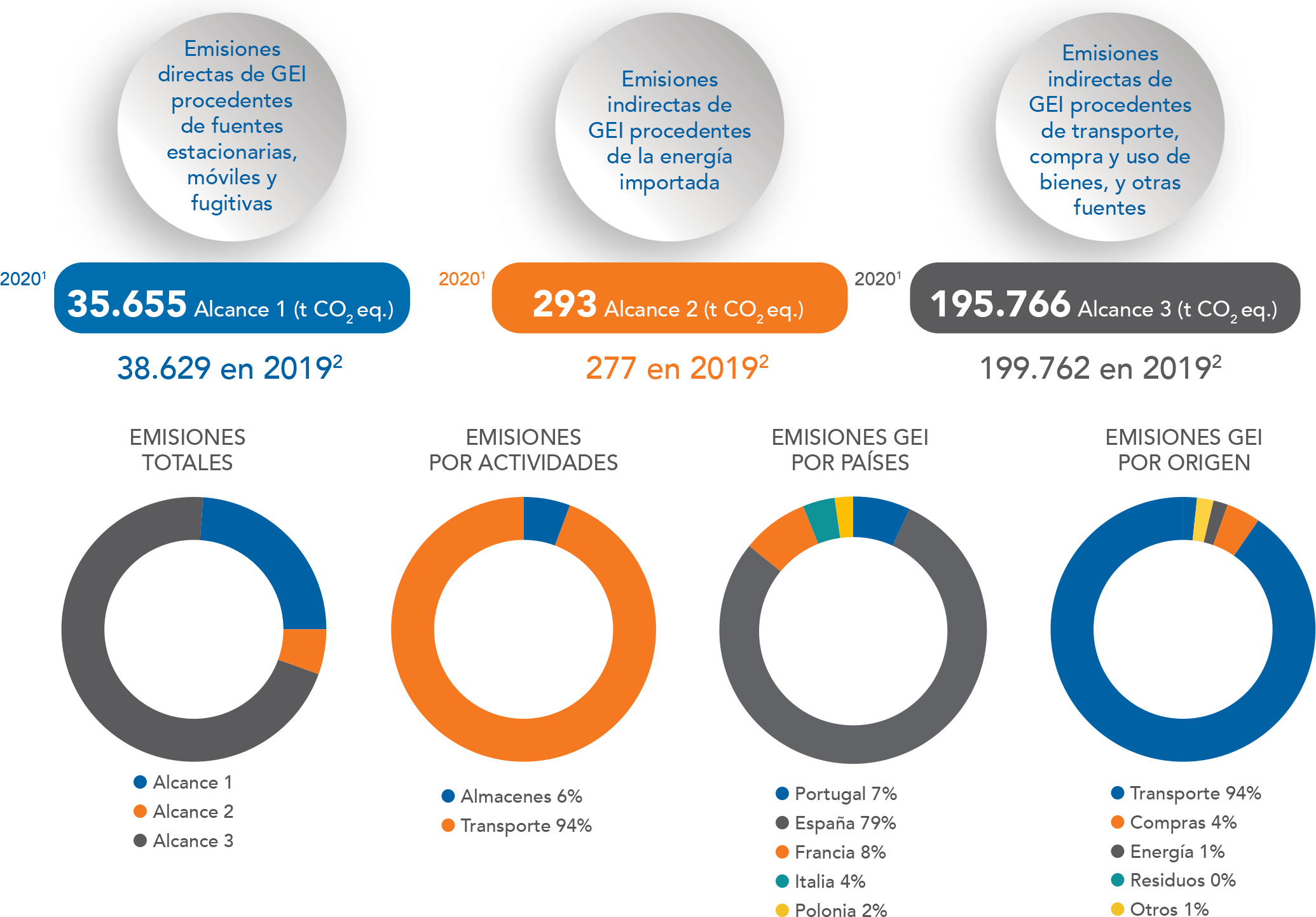
1 For the months in which no current data is available, a calculation has has been made based on estimated forecasts and/or data from the previous year.
2 The reason for the variation between the ‘2019’ data reported in the non-financial information statement (EINF) for the 2019 financial year compared with those reported in the 2020 EINF is due to the adjustment of estimated data from the previous year to the updated data obtained in 2020.

Noise and light pollution
Noise during daytime and night-time hours is measured at each of Logista’s facilities as per the frequency stipulated by environmental regulations. If the measurements show values close to the legal limit, action plans have been established to correct the noise level.
Light pollution is not significant, so the Group has made no specific arrangements for this aspect.
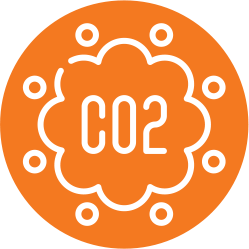
Measures adopted to reduce carbon emissions
The Group reduces emissions by continually optimising routes and renewing transport fleet agreements, including efficiency criteria, promoting a gradual increase in the fleet of vehicles that operate with less polluting fuels.
During this financial year, Nacex has also strengthened its network of delivery and collection points (Nacex.shop), offering an option for local delivery through retail outlets and Smart Lockers, and helping to reduce last-mile delivery with the consequent reduction in CO2 emissions, in line with Logista’s environmental strategy.
99% of the Group’s premises use renewable electricity, including all the Group’s directly managed centres in Spain, France, Italy and Portugal.
In addition, measures taken to improve energy effciency and increase the use of renewable forms of energy, which are described below in Energy Consumption, also foster the reduction of greenhouse gas emissions.

Awards
Logista was once again recognised in 2020 as one of the global leaders in combating climate change, having been included in CDP’s prestigious ‘A list’ on the basis of the company’s 2019 climate report.
Logista is the only European distributor, and one of the only two global distributors, to be included in the ‘A-List’ for the fourth year running. Only 3 Spanish companies, and 30 worldwide, have managed to maintain this distinction for 4 consecutive years.
Every year, Logista sends CDP information about the Group’s management of climate change at corporate level and at individual business level. This information can be viewed on CDP’s website.

Measures adopted to adapt to the consequences of climate change
The current risk management system provides for the analysis and definition of action plans to address the consequences that climate change may have for the Company in the short and medium term.
Emission reduction targets
Global emission reduction target
Logista has developed its own Sustainability Index to identify opportunities for reducing emissions, based on the Science-Based Target (SBT) initiative.
After analysing all the existing methodologies, Logista has taken the view that the GEVA method (Greenhouse gas emissions per value-added unit) is the most suitable method for its activity.
Logista has reviewed this methodology and adapted it to its transport activity, since it is the most pertinent in terms of emissions within the Group. The proposed unit must therefore take account of the distances covered.
This indicator shows the Overall Performance of Logista’s emissions because it includes Scope 1 (which includes transport activities with operational control), Scope 2 and Scope 3 (which include all emissions related to transport activities without operational control: upstream and downstream emissions) emissions, as well as emissions from franchise transport.
Logista has considered CDP recommendations concerning year-on-year reduction and included an annual emissions reduction of 2.1%. Logista has also included the vast majority of Scope 3 emissions in its targets, following the GEVA recommendation referred to above, since 84% of Logista’s emissions come from Scope 3 categories. The result is an Overall Target which accounts for and includes 95% of all Logista’s emissions (considering Scopes 1+2+3).
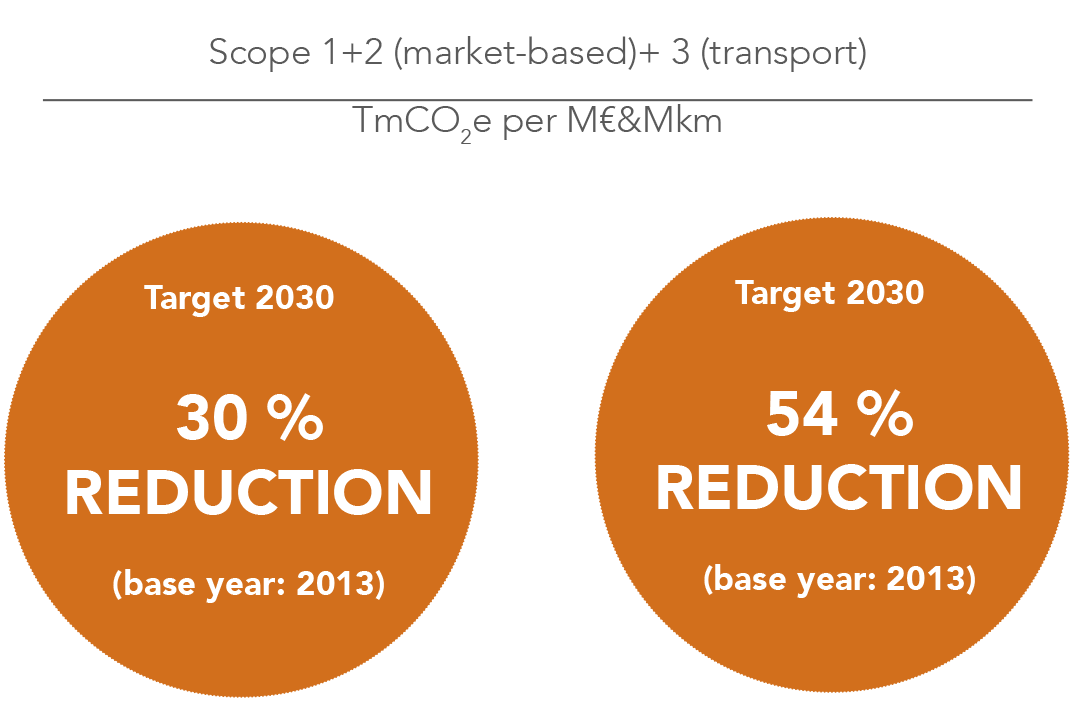
Logista is currently working on rolling out this emissions reduction target in its primary processes.
Renewable Energy Consumption Target
Committed to renewable energy, Logista aims to consume green energy in all its directly managed offices in Spain, France, Italy and Portugal (Poland is not included because its electricity consumption accounts for 2%).
2020 target = 99% (achieved)
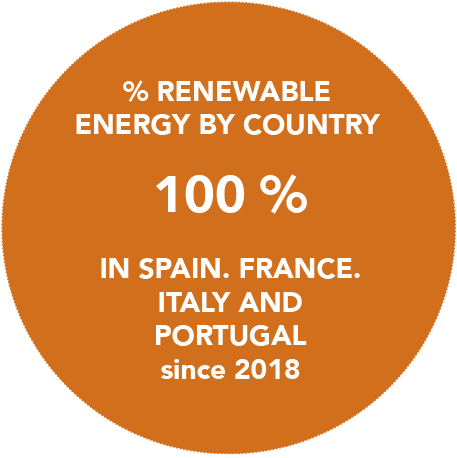
Sustainable use of resources
Logista is fully aware of how important the efficient use of resources is. As such, it compiles and analyses information about water consumption, waste and about the materials that are most important for the Group.
Use of materials by source
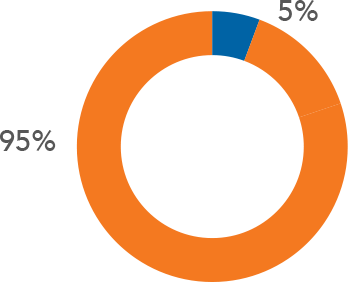
|
20201 (Kg) |
20192 (Kg) |
| Renewable material |
10,981,417 |
11,580,263 |
| Non-renewable material |
596,018 |
603,670 |
The following categories are considered “Renewable material”: Pallets, paper, cardboard boxes and lids.
The following categories are considered “Non-renewable material”: Bags, wrapping film and airpad.
1 For the months in which no current data is available, a calculation has has been made based on estimated forecasts and/or data from the previous year.
2 The reason for the variation between the ‘2019’ data reported in the non-financial information statement (EINF) for the 2019 financial year compared with those reported in the 2020 EINF is due to the adjustment of estimated data from the previous year to the updated data obtained in 2020.
Water consumption
The discharging of wastewater is not considered a relevant aspect at Logista because, due to the Group’s type of activity, this water is discharged into municipal water systems.
In the 2020 financial year, water accounted for 0.04% of the Group’s environmental impact, because it is only used for sanitary purposes (0.01% in 2019).
In the 2020 financial year, 98,410* m3 of the supply network was consumed, in accordance with local limits. In 2019, water consumption from the supply network stood at 93,873 m3 and was in line with the established local limits.
* For the months in which no current data is available, a calculation has has been made based on estimated forecasts and/or data from the previous year.
Consumption of raw materials
The principal raw materials consumed by the Group and their quantities are shown below:
|
20201 (t) |
20192 (t) |
| Airpad film |
118 |
119 |
| Cardboard boxes and lids |
8,556 |
8,238 |
| Pallets |
2,142 |
3,005 |
| Paper |
283 |
337 |
| Single-use plastic bags |
14 |
19 |
| Reusable bags |
1 |
6 |
| Wrapping film |
463 |
460 |
| Biodegradable bags |
0 |
0 |
1 For the months in which no current data is available, a calculation has has been made based on estimated forecasts and/or data from the previous year.
2 The reason for the variation between the ‘2019’ data reported in the non-financial information statement (EINF) for the 2019 financial year compared with those reported in the 2020 EINF is due to the adjustment of estimated data from the previous year to the updated data obtained in 2020.
Efficiency measures
Effciency measures for improving the use of raw materials include the recovery of reusable cardboard boxes through a system involving specific continuous improvement actions.
In addition, the Group’s Environment, Quality and Energy Efficiency Policy includes, among its commitments, the implementation of policies and good practices for the rational use of resources, where the formula underpinning its processes is optimisation.
Circular economy, waste prevention and management
The Group has significantly reduced waste and emissions produced by its activity through the use and recovery of reusable cardboard boxes, via a system already implemented at Logista’s centres in Spain, France, Italy and Portugal, and in its specialist express courier service for parcels and documents.
Due to the nature of its activity, the main types of waste currently generated by the Company are paper and cardboard, wood (pallets), municipal waste, plastics and oils.
Hazard classification 2020
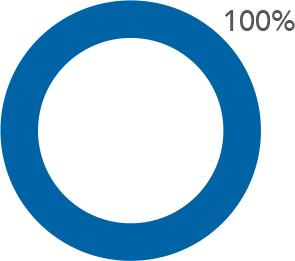
Classification by end use 2020
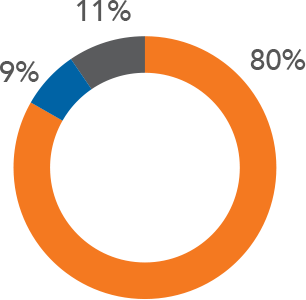
|
20201 (Kg) |
20192 (Kg) |
| Hazard classification |
| Hazardous |
9,686 |
14,829 |
| Not Hazardous |
15,886,901 |
14,919,129 |
| Classification by end use |
| Recycling |
12,744,465 |
13,079,971 |
| Landfill |
1,397,173 |
1,506,861 |
| Energy recovery |
1,754,950 |
347,126 |
The following wastes are considered “Hazardous”: batteries, accumulators, absorbent materials, contaminated packaging and oils.
The following wastes are considered “Non-Hazardous”: tires, waste that can be classified and processed as urban waste, paper, cardboard, plastics and wood.
1 For the months in which no current data is available, a calculation has has been made based on estimated forecasts and/or data from the previous year.
2 The reason for the variation between the ‘2019’ data reported in the non-financial information statement (EINF) for the 2019 financial year compared with those reported in the 2020 EINF is due to the adjustment of estimated data from the previous year to the updated data obtained in 2020.
Energy management
The main sources of energy consumption in the Company are electricity, natural gas, diesel and fuel oil. The quantities consumed are shown in the following table:
Total energy by country 2020

|
20201 |
20192 |
| Portugal |
2,490,840 |
2,477,755 |
| Spain |
35,599,118 |
36,454,178 |
| France |
14,096,594 |
14,893,120 |
| Italy |
9,004,673 |
8,938,481 |
| Poland |
1,123,258 |
1,010,108 |
Energy consumption 2020 (Kwh)

|
20201 |
20192 |
| Electricity consumption |
50,248,755 |
51,296,225 |
| Natural gas |
11,561,095 |
11,943,137 |
| Other energy consumption |
504,632
Diesel: 455,004
Fuel oil: 49,628
|
534,281
Diésel: 431,708
Fuel Oil: 102,573
|
1 For the months in which no current data is available, a calculation has has been made based on estimated forecasts and/or data from the previous year.
2 The reason for the variation between the ‘2019’ data reported in the non-financial information statement (EINF) for the 2019 financial year compared with those reported in the 2020 EINF is due to the adjustment of estimated data from the previous year to the updated data obtained in 2020.
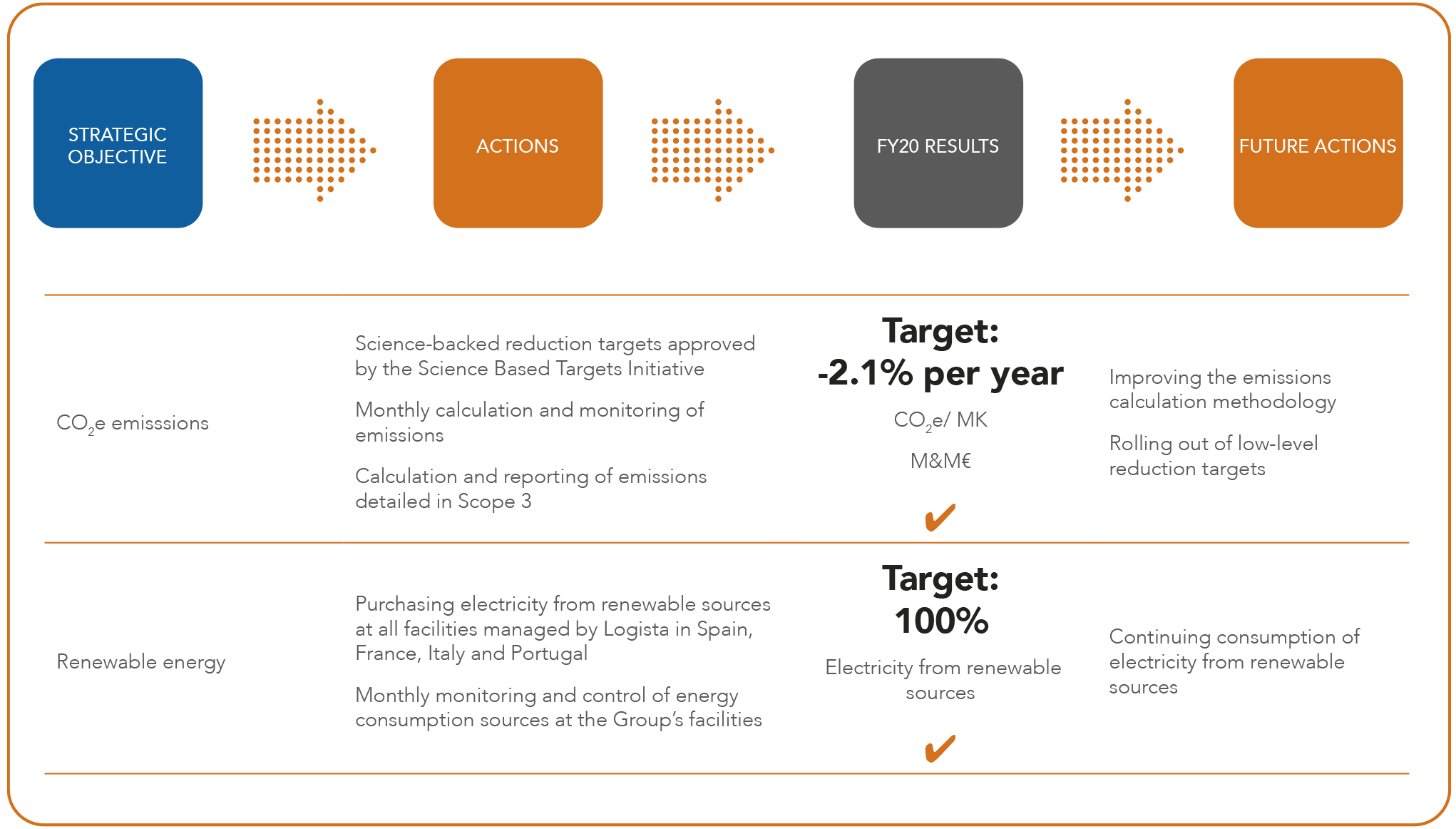
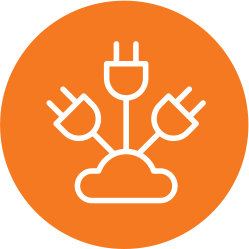
Measures adopted to improve energy efficiency
Logista is implementing several action plans in order to achieve fuel and energy consumption savings, such as: optimising routes, upgrading fleets, adjusting the volume of existing infrastructure, setting local targets and reduction initiatives in our main warehouses, implementing energy effciency criteria in new and existing premises, etc.
Energy audits are carried out regularly on the Group’s principal processes and warehouses. The results are used to identify and prioritise actions to reduce consumption.
Other actions undertaken by Logista to reduce energy consumption include:
- LEED/BREAM certification for new premises.
- The continuous implementation of corporate and local projects (monitoring consumption, lighting replacements, improving insulation, updating equipment, etc.).

Measures adopted to improve renewable energy use
As a Group committed to renewable energy, Logista aims to consume green electricity in all its directly managed offices in Spain, France, Italy and Portugal.
In the 2019 financial year, Logista consumed 51,296 MWh, of which 50,942 MWh corresponded to the purchase of renewable energy. In the 2020 financial year, Logista’s electricity consumption fell to 50,249 MWh, with the purchase of renewable energy accounting for 49,873 MWh. This renewable energy consumption entails an estimated saving of 13,866 metric tonnes of CO2e compared with conventional energy consumption, taking into account the different emissions factors in each country.
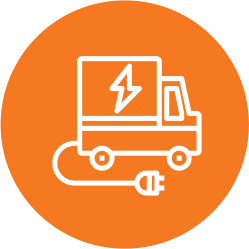
Measures adopted to ensure sustainable mobility
Logista is part of the national mobility committee set up by Spain’s General Traffic Directorate (DGT) and works on the ‘Autonomous Ready’ project driven by the DGT and Barcelona city hall. This project aims to lay the foundations for the testing and approval of autonomous vehicles and to define a regulatory framework that guarantees safe and sustainable urban mobility.
Meanwhile, temporary (remote working) and permanent (flexitime, compressed hours) measures introduced by Logista in 2020 are in line with calls by cities such as Madrid on the staggering of employee travel around times of peak traffic and congestion.
Protection of biodiversity
Logista’s activity does not have a direct impact on protected areas. This is why biodiversity is not included in the Company’s material considerations.
There was no significant impact on biodiversity during the 2020 financial year.




















